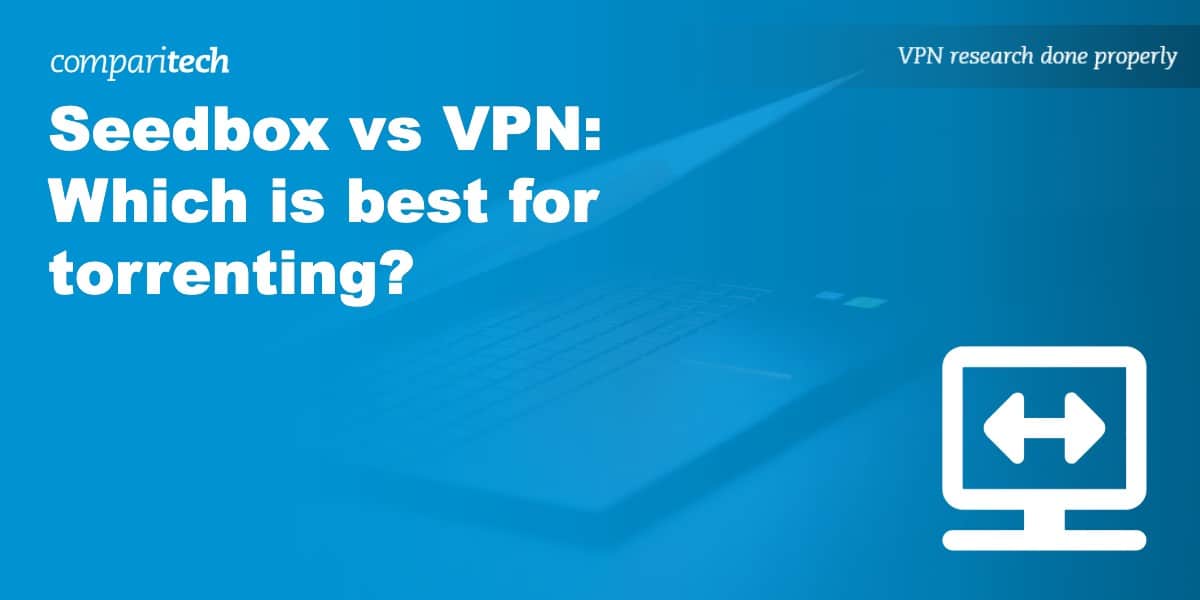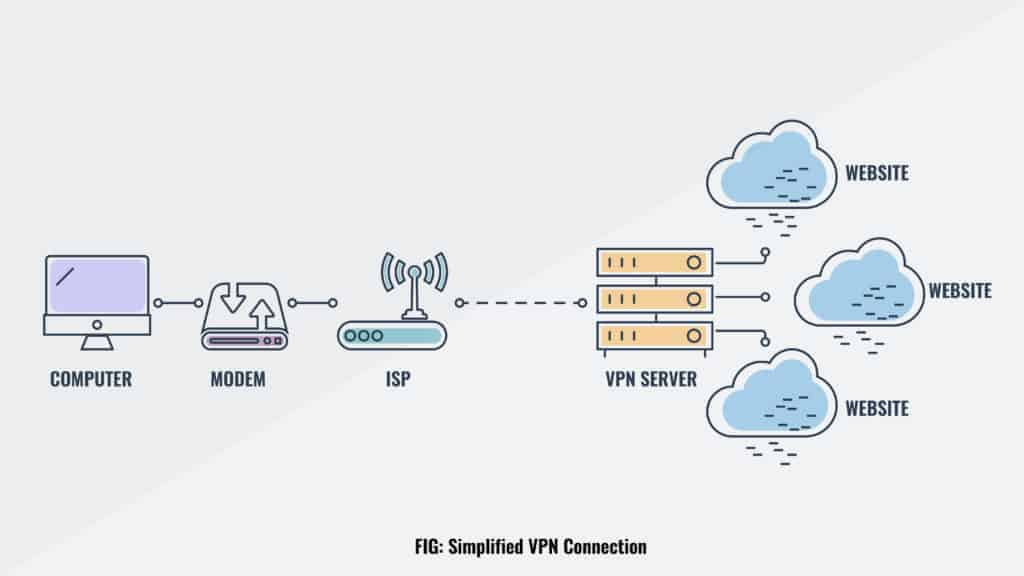Torrenting seems pretty straightforward at first glance but scratch beneath the surface and things get technical very quickly. New users quickly have to learn a seemingly endless amount of jargon and due to the complex nature of P2P communications. That’s where we come in. We’re here to cut through the noise and explain a few critical things including what exactly Seedboxes and VPNs are, and the impact each has on your peer-to-peer activity.
Our hope is that this will help you make more informed decisions about your privacy, your downloading habits, and ultimately, the services you spend your money on.
What is a Seedbox?
A Seedbox is just a remote server with very high upload and download speeds (usually at least 10 Gbps). It essentially acts as a middleman between you and the torrent swarm (which is what we call every other person with a piece of the file you’re trying to download). In short, the Seedbox will get the complete file as quickly as possible, and you then download the file from the Seedbox.
There are a couple of situations where this kind of setup is extremely useful. For instance, if you want to share your own content, it’ll usually take a very long time since anyone who wants to torrent it will only be able to do so when your PC is online (because you are the only person with the complete file and can only upload it as quickly as your home internet speeds allow).
While most people use torrent sites that anyone can access, there are also more exclusive groups that pride themselves on sharing hard-to-find or particularly high-quality content. You’ll usually have to create an account with these groups, which is why they’re called private trackers. However, you may find your access revoked if you fail to seed (that is, share) torrents enough. A Seedbox sidesteps this issue by allowing you to deliver files to anyone who wants them near-instantaneously without any impact on your usual internet speeds.
What is a VPN?
A VPN does not offer storage and instead functions as a secure relay between the internet and your home devices. Whereas a seedbox downloads and stores files on a remote server, a VPN routes downloads files through the VPN server and then to your local storage.
Virtual Private Networks allow users to send internet traffic through remote servers, which hides their true IP address. Given that this is normally visible to anyone torrenting the same file as you, it’s clear VPNs already offer a huge advantage for privacy-minded users. That’s not all, though: VPNs also encrypt your traffic, they prevent anyone monitoring the network (such as an Internet Service Provider) from seeing which sites you visit.
Normally, these organizations would have a pretty good idea of what you’re doing based on the ports you’re sending data through. However, as all encrypted traffic looks the same, they have no way of knowing what you’re doing.
This makes VPNs excellent for avoiding automatic throttling, which is when a service provider intentionally reduces the internet speeds of users who perform specific tasks (usually streaming or torrenting).
There is a tradeoff, though. Encryption algorithms take time to run, which means you’ll notice a slight decrease in speed when connected to a VPN. Huge progress has been made in this area recently, and providers have a much smaller impact than even a few years ago. Still, this bears mentioning as it’s one of the technology’s downsides.
How is a Seedbox different from a Virtual Private Network?
A seedbox is a remote server where downloads are stored and made accessible to other users of a particular torrent client. A VPN server, by contrast, stores nothing and solely acts as a secure relay between your device and the internet.
Seedboxes are primarily designed to get you your files faster, and although using them hides your real IP address (since the swarm only sees the Seedbox’s IP address), that’s about as far as their privacy benefits go. In fact, as Torrentfreak shows, Seedbox providers are more likely to store personally identifiable information such as your IP address, email address, and billing address.
In contrast, VPNs are built with privacy in mind. These tend to keep as little identifiable data as possible, with some providers refusing to log anything other than analytical data. VPNs not only hide your IP address, they also use encryption to stop anyone from keeping tabs on your activities. Additionally, this encryption can help you bypass web-blocking on public wi-fi or, with some providers even offering the ability to browse the wider internet in places like China or the UAE. Finally, VPNs let users switch freely between servers all over the world, making them ideal for accessing region-specific content.
Can I use a Seedbox and a VPN at the same time?
It is technically possible to route Seedbox traffic through a VPN. That said, it makes more sense to use the VPN on your computer while downloading from the Seedbox, rather than having your Seedbox use a VPN while obtaining torrents. After all, your Seedbox would have its speed limited by a VPN and because they’re independent of your system, they aren’t subject to ISP throttling, so the benefits of using both while torrenting would be minimal.
By connecting your PC to a VPN before downloading the files, you can prevent your Seedbox provider from collecting information such as your real IP address (and therefore, location). Assuming you signed up to a Seedbox service that didn’t require any personally identifiable info, this gives you a double layer of privacy, since the Seedbox has one IP address, and the VPN has another, neither of which can lead back to you personally.
Do I need to set up port forwarding If I have a Seedbox?
In simple terms, port forwarding makes your device an active node, allowing it to communicate with everyone else who has a specific file, rather than just other active nodes. With more people to get the file from, you’ll normally notice faster downloads, which is why port forwarding might be a good idea if your base internet speeds are already pretty low.
By default, most routers and VPNs have a built-in NAT firewall that rejects unsolicited requests to your device from the internet. When seeding a torrent, however, those unsolicited requests are common from other users who want to download your files. Port forwarding allows unsolicited requests on the specified port, which means you can connect to more users in a torrent swarm and increase throughput.
Here’s the thing: just about any Seedbox will be multiple times faster than your home connection. As a result, you’ll notice a dramatic decrease in the time it takes to fully torrent large files, even without access to the full range of peers. Having said that, some Seedbox providers now offer the ability to set up port forwarding, but it’s not strictly necessary for a smooth experience.
Should I use a proxy when torrenting?
Proxy servers might seem like an easy way to shield your identity from copyright trolls and other assorted snoopers. Unfortunately, this isn’t the case. Proxies do hide your IP address but they offer neither the speed of a Seedbox nor the encryption of a VPN. To make matters worse, it’s often difficult to tell who runs a particular proxy or what information they’re recording about your usage.
Free VPNs are also best avoided. Many log personal information for advertising purposes and usually do not provide the same level of security as their subscription-based counterparts. They’re also slow, with far too many users for the number of servers they’re able to maintain.
Is torrenting legal?
Torrenting is just a method of downloading files from multiple sources simultaneously as opposed to getting it from one source (such as a traditional website). This in itself is not illegal in most of the world.
Instead, downloading copyrighted content such as recently-released movies or TV shows is what usually gets people into trouble. This might come in the form of a warning letter from their ISP or a legal threat from a copyright holder (that can conveniently go away for a steep fee). As long as you’re only sharing content you have a right to, such as public domain movies or your own music, there’s no reason to worry.
Which is the best torrent client?
μTorrent is by far and away the most popular BitTorrent client – though qBittorrent is a better option and doesn’t rely on ads and paywalls. Other popular potions include BitTorrent (BitTorrent’s own client), LibTorrent, and Transmission. Deluge and rTorrent/ruTorrent are typically recommended for Seedbox users. All of these options are compatible with VPNs.
Disclaimer: Although we’ve spent hours researching this topic, we are not legal experts. As such, nothing we’ve said above should be taken as legal advice. We encourage you to only download content you have a right to access and to consult local laws or perhaps even seek a professional’s opinion before using P2P networks.








